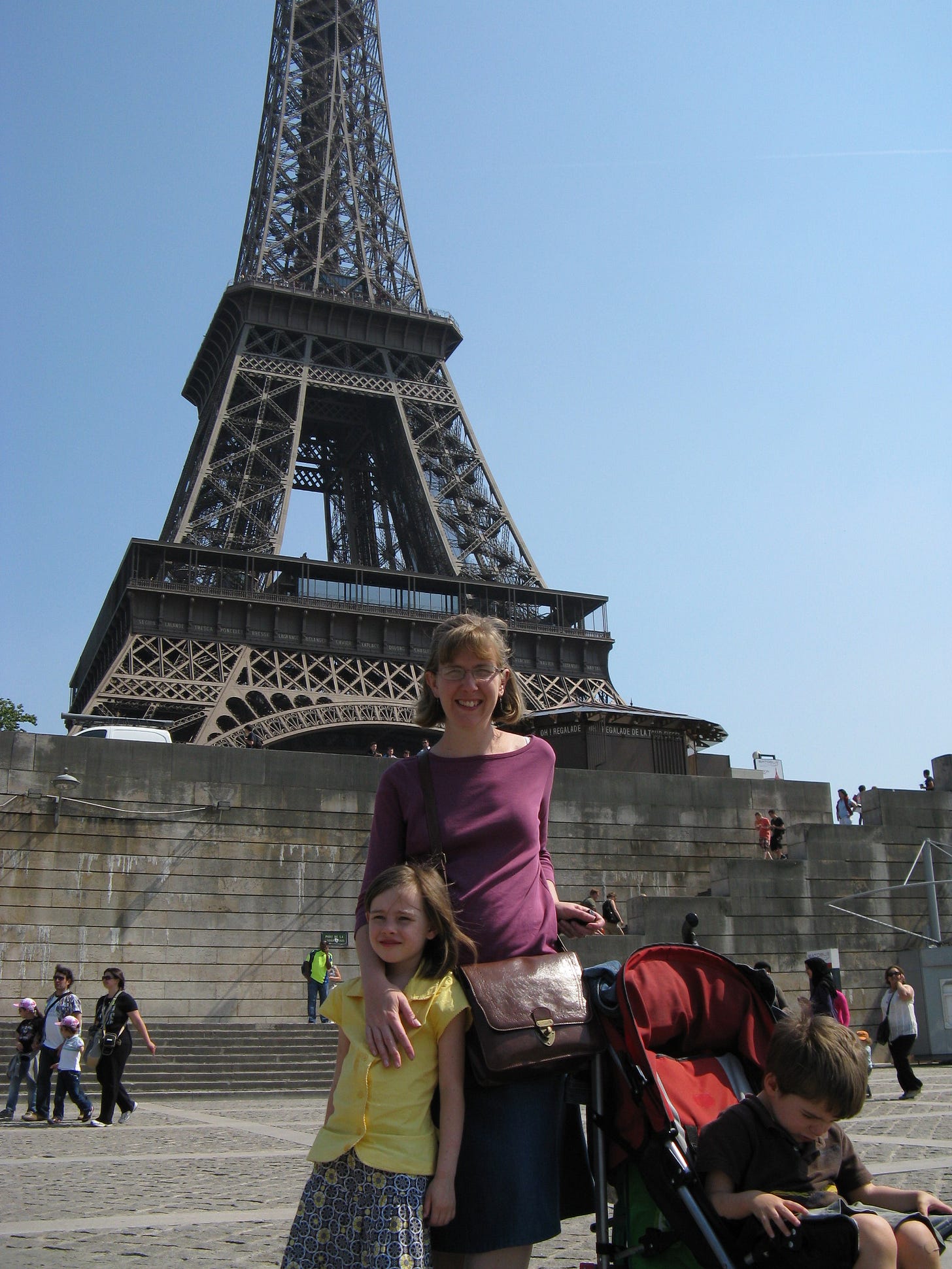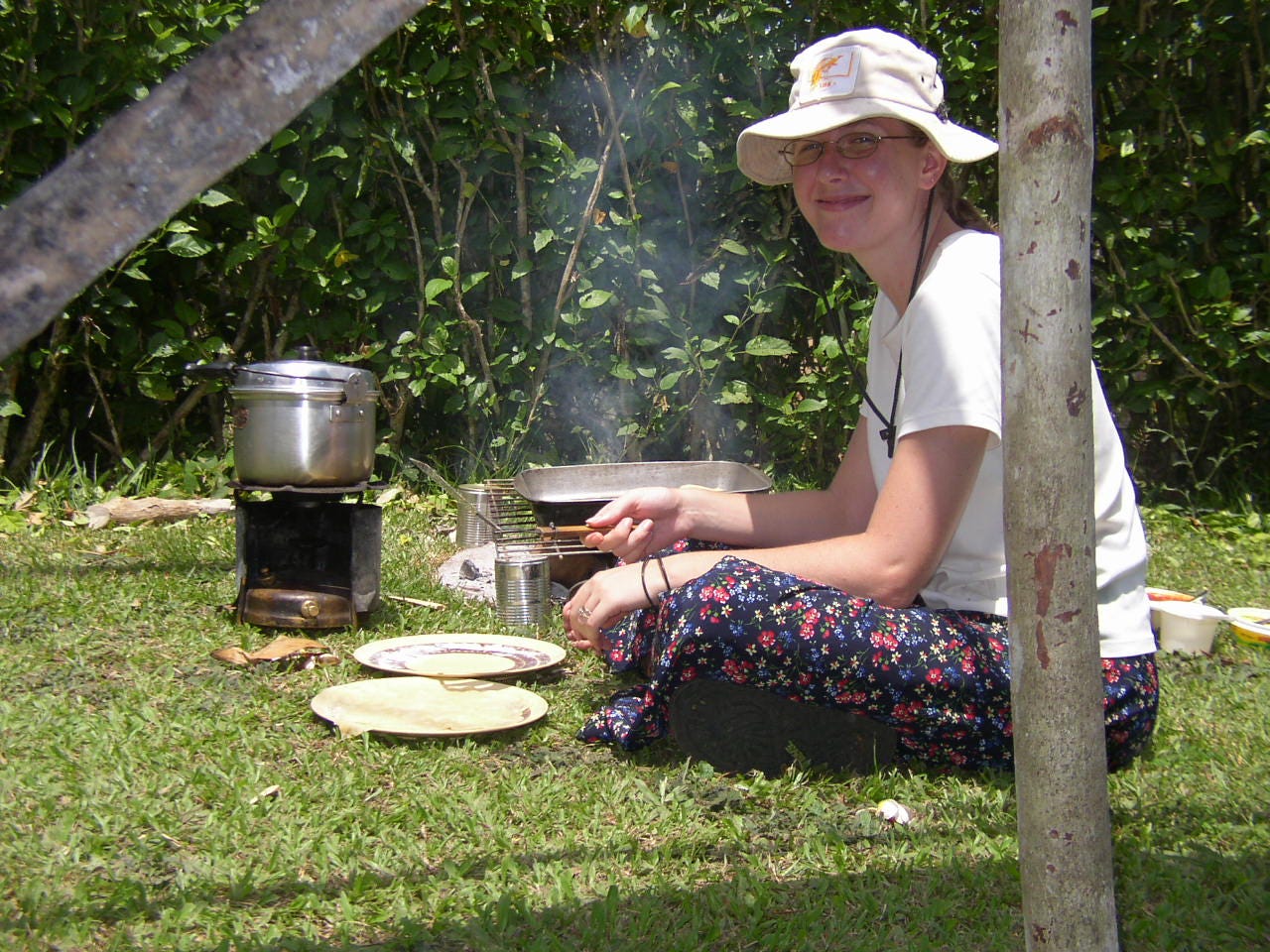Happy Monday, Friends!
A couple of weeks ago, over on the Ambleside Online forum, I happened to notice an old thread from September 2012 that had been “bumped” back up into the realm of active posts.1 Someone had posted a question about whether or not life overseas was simpler than life in the United States. My 2012 response to this post was as follows:
I would say for us, [life overseas] is simpler in the sense that we don't have as many options for outside activities, therefore we don't DO as many outside activities, and therefore we don't run around as much. We also find holidays much simpler since we usually just celebrate as an immediate family rather than large extended-family gatherings. We've actually come to really enjoy this in our family (although don't get me wrong, we like spending time with our extended family too!).
At the same time, we don't have a lot of the same conveniences as most people in the US do. It is necessary to cook completely from scratch, hang laundry to line dry, run errands on foot or by public transportation, clean more often because of all of the dirt/dust that gets tracked in, etc. All of which take much more time than in the US. Add in any 'ministry' type activities, and life can get very full, very fast. So I don't know if it is so much that life overseas is SIMPLER more than it is just very, very DIFFERENT in terms of the things that can cause stress and fill up our schedules too quickly.
All these years later, I still concur with the general sentiment of that answer: in my mind it’s not so much a matter of whether or not one is simpler than the other, it’s more that they are just different.
That said, seeing these words from 13(!!) years ago resurface like this has been cause for a lot of reflection over these past couple of weeks.
When I wrote this in 2012, we were living in France - the year we attended language school as we transitioned from a field assignment in Papua New Guinea to one in Cameroon.2 Our children, now teenagers and young adults, were only 2, 4, and 6 years old. That means that I wrote this response before we completely burned out and hit rock bottom – that didn’t come until 2015. At that point, the extreme stress of living overseas ) finally caught up with me:
Security concerns, particularly during the years we lived in Papua New Guinea. I still feel a little weird being out after dark even in my quiet, American, semi-rural suburb.
Constant transitions/goodbyes (between 2010-2015 we made no fewer than 4 major international moves – from PNG to the States to France to Cameroon and back to the States - with very small children in tow. Also throw in a maternity leave in Australia for the birth of our third child and the fact that during that in-between year in the States, we did not have a home base or stay anywhere longer than about 2 months.)
The work of just living was harder. Navigating the busy capital city of Yaoundé, Cameroon as a person with some sensory sensitivities was an experience. Something as simple as going downtown to grocery shop would lay me flat out for days. It was always hot and sticky. The battle against ants in my kitchen never ended. And we rarely achieved the great trifecta of water, power and internet all working at the same time. In the moment, we just learned to roll with it, but all these years later power outages still get me
a littlea lot antsy.And perhaps most of all, there was the weight of expectations – both real and perceived – from others: supporters, colleagues, God. Oh, how I did not want to let down God by being a “bad missionary.”
We came home during the summer of 2015 for what we expected to be a year-long furlough, but ended up making the decision to stay in the States permanently for the health of our family. Ten years later, I still think that was a good and wise decision that has allowed us the space to heal some brokenness and a stable place from which to launch our children out into the world. God has been good and faithful and kind. But leaving that set of “cross-cultural living” stressors behind doesn’t mean we have entered some kind of simple, stress-free utopia. We’ve just traded one set of stressors for another:
Finance and job security.
The tyranny of the calendar (especially as those little ones have become teenagers and young adults with different needs and interests and friend groups).
Watching teenagers learn life lessons the hard way.
Navigating situations of church hurt.
Nope, one is not simpler than the other. They are just different.
I wonder if some of this “either/or” dichotomy comes from a shallow understanding of the idea of simplicity.
I’ve observed that sometime people living ordinary suburban lives in the States perceive the overseas lifestyle as being “simpler” because it reduces or eschews entirely some of the distracting trappings of modernity. On the flip side of that, during the years I lived overseas I know I was certainly jealous of my American friends with their clothes dryers and convenience food options and being able to go out into town to run errands without needing a vacation afterwards: all things I thought would make my overseas life simpler.
Having lived a significant number of years on both sides of the equation now, I’ve come to think that there is a bit of a false dichotomy at play here and that simplicity has much less to do with the external life choices and much more to do with the state of the heart.
Richard Foster defines simplicity less in terms of our outward lifestyle and situation, but something that is rooted first and foremost in the state of our heart: “it is an inward reality that results in an outward lifestyle.”3 Far too often we miss one or the other or both of these realities.
Clinging to an outward form of simplicity without the inward reality of heart leads to legalism and idolatry.
An inward heart attitude towards simplicity that doesn’t manifest itself in one’s outward lifestyle is incomplete at best and hypocrisy at worst.
Ignoring both is perhaps a defining characteristic of our contemporary age: “we have not unity or focus around which our lives are oriented…our need for security has led us into an insane attachment to things…we crave things we neither need nor enjoy…conformity to a sick society is to be sick.”4
During the years we lived overseas, I fully embraced (perhaps more by necessity than by choice) the outward form of a simple lifestyle but missed the inward reality that went with it. Trying to maintain that outward simplicity of the “good missionary life” without the inward heart reality that ought to accompany it was part of what led to my crash and burn back in 2015.
Y’all, if it leads to burnout, it isn’t simple.
Foster writes that true simplicity brings freedom, joy and balance.5 True simplicity is embracing the truth of Matthew 6:25-33: it is seeking God’s Kingdom first and trusting that God truly will provide and care for everything else that we need.6 It is, I think, a spirit of contentedness – a willingness to seek our fulfillment in Jesus no matter our external circumstances, as Paul discovered the secret of being content in seasons of plenty and in seasons of want (Philippians 4:11-13). It is to graciously receive whatever he gives and not crave something else like the grumbling Israelites in their wilderness wanderings. When we seek the good of God’s Kingdom first and become truly content in His provision and care, this has implication for how we live. We can live freely and generously and with open hands without clinging to external security blankets – whether that blanket takes the form of acquiring more stuff or the form of eschewing external comforts as a need to prove something.
The truly simple life is not about where you live: overseas or in the USA, on a rural homestead or in the suburbs. It’s not about if you farm your own food or shop at Walmart. It’s not, at the root, about any external marker. Rather, the truly simple life is one that is lived with an unwavering trust in Jesus. And when our hearts are firmly rooted in Jesus, that will overflow into the way we live.
I’m still on the road to truly and joyfully being able to embrace this true simplicity after crashing and burning back in 2015, but it was the recognition of this truth that brought restoration and set me on the path to freedom and healing.
Until Next Time,
Heavenly Father, you have made us for yourself, and our hearts are restless until they rest in you: Look with compassion on the heartfelt desires of your servants, and purify our disordered affections, that we may behold your eternal glory in the face of Christ Jesus; who lives and reigns with you and the Holy Spirit, one God, for ever and ever. Amen.7
Jen
Bits and Pieces
Reading/Listening/Watching: This letter is coming to you a little late because I spent the weekend at our Synod - the big annual gathering for the Anglican Diocese of the Carolinas where I am privileged to serve as clergy. Our speaker this year was Dr Amy Orr-Ewing, an international speaker, evangelist, and apologist. She shared with us powerful stories of the way that the Lord is actively working all over the world and it was both challenging and encouraging to hear. You can check out her work here - it’ll be worth your time!
Taking Delight: In addition to the excellent teaching, it was also a joy to connect with many dear friends and colleagues who I don’t otherwise get to see all that often because we are scattered all over North and South Carolina carrying out our respective ministries. I snagged this candid photo off the ADOC Facebook page because I think it sums up my weekend pretty well:
There was also cause for delight for my particular congregation, Resurrection Anglican, as we “graduated” from church plant status to a full-blown congregation. Truly, so much to be grateful for. God is good.

Thinking About:
“Most religious experiences try to transcend the body, but Jesus meets us in our embodied suffering by entering into it. God has demonstrated his love for us in this: while we were still sinners Christ died for us.”
~Dr. Amy Orr-Ewing (loosely, based on my notes from her talks this weekend).
I am no longer all that active on the Ambleside Online forum or really any homeschooling places as my active homeschooling days are rapidly drawing to a close. But I occasionally pop back in for old times’ sake.
This is another story for another day, but for those who don’t know our family’s story: my husband and I served as missionaries in Papua New Guinea from 2001-2011 and then Cameroon from 2013-2015. We spent a year in the States for family visits and fundraising and then a year in language school in France in between: it is that in-between season I am referencing here.
Richard Foster, Celebration of Discipline: The Path to Spiritual Growth, p. 79
Foster, p. 80
Foster, p. 80
Foster, p. 86-88
Collect for the Third Sunday in Lent, 2019 Book of Common Prayer, p. 606







